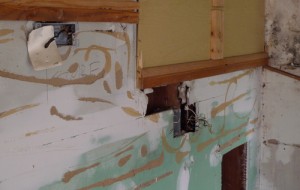Metal pirates strip too much of what’s left from Michigan cities, lawmakers grope for answers

When it comes to scrap-metal theft in Detroit and other Michigan cities, nothing is sacred.
Literally nothing. Besides the theft of plumbing, wiring, siding and trim from buildings both empty and occupied, scrappers have even targeted Jesus – a statue of the crucified Christ was removed from its cross on an exterior wall at Detroit’s Church of the Messiah in 2008. The piece was recovered two days later, presumably after thieves realized its green coloring wasn’t aged copper, but paint.
“They’ve taken mausoleum doors from Woodmere Cemetery,” said Rep. Rashida Tlaib, D-Detroit. “They’ve gotten onto the copper roof of Holy Redeemer Church and stolen pieces of it.”
Tlaib was co-sponsor of a package of bills that would have toughened rules for scrap-metal dealers, requiring them to photograph material, train employees to recognize stolen metal, and delay payment and other changes. But the bills stalled in the House Regulatory Reform Committee earlier this summer over strong objections from the industry, and Tlaib said now the work group that drafted the legislation will go back to the drawing board.
“We want illegal scrappers to stop being invisible,” she said. “But I don’t know what will change (in the bills).”
Attorney George Curran offered testimony on behalf of a group calling itself the Responsible Recyclers Association. He said the legislative package would put an unfair burden on scrap-metal buyers in its non-compliance penalties; in its lack of funding for enforcement or for a registry of offenders; and in its exclusion of auto recyclers. The group also objected to prohibitions of cash and barter transactions. The Michigan Waste Industries Association declined comment on the legislation.
It’s frustrating to Tlaib, whose district in Detroit has been particularly hard-hit by ravenous scrapping. Not just owners of real property are at risk; the theft of catalytic converters from parked cars is a common crime in and around the city. Roof lines on commercial buildings are lined with rolls of barbed or razor wire, to discourage theft of air-conditioning units.
While scrapping is a law-enforcement problem, Tlaib said, the police need help from the industry.
“The arrests are being made of illegal scrappers, but by the time they get before a judge, there’s no evidence, because transactions are invisible,” she said. “We wanted more of a paper trail.”
Curran’s group disagrees. The industry is currently governed by PA 429 of 2008, which requires scrap dealers to follow certain practices when buying non-ferrous metals, including copper, aluminum and brass. Sellers must have a state-issued photo ID, consent to a thumbprint, sign a statement that the material is not stolen and verbally report the material’s source. Information is kept on file for a year. Special conditions apply for oft-stolen copper: The metal is tagged and held for seven days, and any seller offering mostly copper for sale must be paid by check.
During one hearing, Rep. Tom McMillin, R-Rochester Hills, asked a witness, “How much more policing do you want businesses to do for you?”
That’s an open question, said Andrew Arena, executive director of the Detroit Crime Commission, a nonprofit that has made metal theft a priority in the city. But in general: More. It’s the only answer in a city where average police response time is an hour, and where law enforcement can barely keep up with crimes against people, much less property.
“Right now the burden is on the (property owner),” said Arena. “What are you supposed to do, stand guard seven days a week? Because that’s what it would take.”
Arena described a recent tour of a neighborhood near Detroit’s Eastern Market where the driver had to swerve around open manholes. The theft of manhole covers is common in both the city and its suburbs.
“When a guy comes in with five manhole covers and seven catalytic converters (to sell), isn’t it safe to assume these are stolen goods?” Arena asked.
In testimony, Curran acknowledge “bad actors” among the industry, but said “95 percent” of Michigan metal recyclers are honest brokers. The Responsible Recyclers Association has proposed a $1-per-transaction fee, half of which would be directed to the Michigan State Police to fund a database of offenders, the other half to local law enforcement to target metal theft.
Meanwhile, the problem continues. Detroit residents learned earlier this summer that the fountain at Hart Plaza – where summer festival-goers cooled off – would be turned off indefinitely, due to damage from scrapping.
Sen. Jim Ananich, D-Flint, who served on the House work group before moving to the Senate earlier this year, hopes the bills will be reconsidered after the summer break, said his spokesman, Tom Lenard.
“We’re disappointed there wasn’t more progress with House hearings, but we’re not giving up. Our hope is to stay focused on the House bill and go from there,” Lenard said.
“It’s such a pervasive problem,” said Randy Lewarchik, who has bought and restored many buildings in Detroit. “It’s really hard to build something, reconstruct something, and so easy to quickly destroy. The challenges are great enough (in Detroit) as it is. We pay high taxes, high insurance due to all these issues, and once you stack theft on top of it, it’s really burdensome.”
However, “catching them in the act is pretty much the only way to get them punished,” he said.
See what new members are saying about why they donated to Bridge Michigan:
- “In order for this information to be accurate and unbiased it must be underwritten by its readers, not by special interests.” - Larry S.
- “Not many other media sources report on the topics Bridge does.” - Susan B.
- “Your journalism is outstanding and rare these days.” - Mark S.
If you want to ensure the future of nonpartisan, nonprofit Michigan journalism, please become a member today. You, too, will be asked why you donated and maybe we'll feature your quote next time!
 TRASHED: The pastor of a Detroit church hoped to convert the closed Vetal Elementary School in Detroit into a career training center. However, once scrappers gained entrance to the building, they quickly made it unusable. This bathroom's damage is typical. (Bridge photos by Nancy Derringer)
TRASHED: The pastor of a Detroit church hoped to convert the closed Vetal Elementary School in Detroit into a career training center. However, once scrappers gained entrance to the building, they quickly made it unusable. This bathroom's damage is typical. (Bridge photos by Nancy Derringer) STRIPPED: Blight in housing stock nearly always includes scrapping. Once houses are abandoned, thieves target plumbing, fixtures and wiring, as in this slated-to-be-demolished house in the Brightmoor neighborhood.
STRIPPED: Blight in housing stock nearly always includes scrapping. Once houses are abandoned, thieves target plumbing, fixtures and wiring, as in this slated-to-be-demolished house in the Brightmoor neighborhood. WARNED: Owners of occupied homes in blighted neighborhoods know their own houses can be entered and destroyed over the course of a few hours. One Detroit resident makes his intentions clear.
WARNED: Owners of occupied homes in blighted neighborhoods know their own houses can be entered and destroyed over the course of a few hours. One Detroit resident makes his intentions clear. ARMORED: Owners of buildings in Detroit know that it's not just the inside of a building that must be protected from scrap-metal thieves, but the outside as well. Rooftop air conditioners at the Brightmoor Community Center are protected with cages and razor wire.
ARMORED: Owners of buildings in Detroit know that it's not just the inside of a building that must be protected from scrap-metal thieves, but the outside as well. Rooftop air conditioners at the Brightmoor Community Center are protected with cages and razor wire.